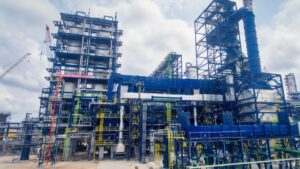
Asset diversification is best option for African oil, gas countries — World Bank
The World Bank has advised oil and gas-rich countries in Africa to adopt asset diversification in oil and gas operations.
This was stated in the May 2023 report titled: ‘Harnessing Natural Resources for Economic Transformation during the Low-Carbon Transition.’
According to giant discoveries in Africa, mostly of oil and gas, have led to permanently higher government debt and, eventually, debt distress episodes, specifically in countries with weaker political institutions and governance.
In the report, the international financial institution said oil and gas –rich countries in Africa have not recorded a lot of success working toward export diversification, so it is time to switch things up.
According to the report cited, policy makers in oil and gas-rich countries on the continent may have more success working toward asset diversification rather than export diversification. Asset portfolio diversification is an important step toward sustained growth and is more feasible for resource-rich countries to achieve than traditional export diversification.
The report quoted the 2021 Changing Wealth of Nations report, which states that targeting asset portfolio diversification, by investing in the expansion of human and physical capital, may be a more successful policy than export diversification for sustainable economic growth.
According to the World Bank report, economic conditions are yet to change for the better in resource-rich countries in Africa. It highlighted the fact that an oil and gas resource boom between 2004 and 2014, did not translate into a significant shift in the asset portfolio composition of resource-rich countries.
A part of the report stated, “Despite the rising value of non-renewable natural assets in resource-rich countries, the value of natural capital available per person grew by less than 2 per cent.
“The boom could have brought the opportunity for resource-rich countries to mobilise economic resources to build better institutions that could secure revenue savings to protect them from price shocks given the commodity market volatility.
“However, evidence shows that resource-rich countries missed this opportunity and instead some indicators of institutional quality tumbled.”
According to the World Bank report, oil and gas resources can jeopardize fiscal sustainability even before the first drop of oil is pumped. Giant discoveries, mostly of oil and gas, lead to permanently higher government debt and, eventually, debt distress episodes, specifically in countries with weaker political institutions and governance.
Nigeria and other oil and gas rich countries in Africa failed to maximize the boom era. The higher rents and attractive windfalls that came with the boom era were not sufficiently channeled into diversifying the economy or into efforts to reduce poverty and inequality. Instead, poverty and inequality increased in many resource-rich countries during the boom.
Now, the dependence on these resources introduced Nigeria and other African countries to serious macroeconomic risks. Analysts at KPMG Nigeria have said that if Nigeria’s oil sector does not make a recovery, Nigeria’s gross domestic product (GDP) growth could be between –0.23 per cent to –1.18 per cent in 2023.
In recent times, the Nigerian economy has faced some challenges and the oil sector is a contributing factor because of crude oil theft and low investments in the country’s upstream sector.



